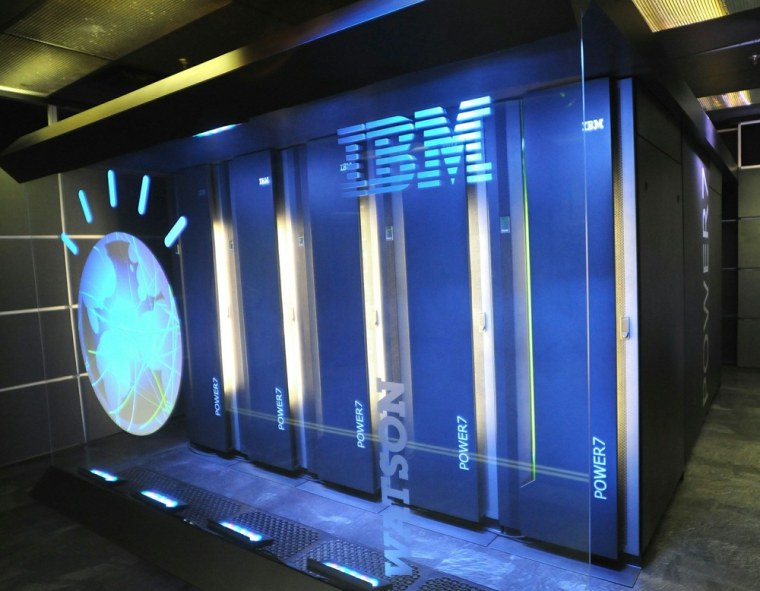It was nice of Watson to donate its $1 million in "Jeopardy!" winnings to charity this week, but don't think for a second that the human-thumping, question-answering machine is purely philanthropic. There are high hopes Watson will make plenty of companies and people piles of money.
To get things started, on Thursday IBM and Nuance Communications announced a collaboration "to explore, develop and commercialize the Watson computing system's advanced analytics capabilities in the healthcare industry."
The collaboration, which also involves Columbia University and the University of Maryland, could lead, for example, to a know-it-all medical assistant. Instead of explaining symptoms to a flesh-and-bone doctor, you'll tell them to Doc Watson. After mulling the information for a split second, the machine will identify what you likely have and prescribe a treatment.
The first commercial offerings could be available in 18 months. Hospitals and clinics may gobble up the technology. What's more, the existence of Doc Watson would likely change what students in medical school study, Herbert Chase, who is working on the project at Columbia University, told the New York Times.
"I have been in medical education for 40 years and we're still a very memory-based curriculum," he said. "The power of Watson-like tools will cause us to reconsider what it is we want students to do."
Consumer interaction
IBM executives also told the newspaper they are in discussions with a major consumer electronics retailer to develop a version of Watson that can interact with consumers to help them with buying decisions and technical support.
Specifics on the project are thin, but experts speaking about Watson in a series of videos on IBM's website note that the technology is almost certain to find a home in tech-support call centers. Instead of yelling at a human for not being able to understand why your gadget doesn't work, Watson will coolly and accurately explain what's wrong so you can fix it and be on your way.
The videos also make clear that the financial services industry is keen to put Watson to use. Just as the machine was able to search through a massive database to come up with the right answer to trivia questions on "Jeopardy!," researchers imagine Watson being able to sift through piles of financial data to spot the next big thing, potentially more efficiently than highly paid Wall Street analysts.
"If you simultaneously see all the research, and financial news, market news, economic information, you could start to ask questions such as which companies are most likely to be acquisition targets over the next three months," said Jay Dweck, who the video identifies as a financial services executive.
Dweck left a position this January as head of a quantitative software and modeling group in Morgan Stanley's sales and trading division, Bloomberg reported. While there, he built and managed software programs that handle trading. Watson, it appears, is envisioned as the next evolution in so-called quant funds, where sophisticated computer models are used to make investment decisions.
A lawyer and consultant?
Other potential applications for Watson's technology may be found in helping legal professionals comb through law cases and civic planners study and resolve traffic issues, according to Investor's Business Daily.
Watson might also have a future as a consultant to the Department of Homeland Security, Darren Hayes, a computer information systems program chairman at New York's Pace University, told the financial news service.
"The focus (on homeland security) has been on information gathering — license plates, credit card transactions, Internet activity, flight manifests, telephone records, bank transactions, and so on — for millions of people. Synthesizing those terabytes of information is tremendously challenging," he said.
Essentially, any task that currently employs intelligent humans to sift through piles of data to find an answer may soon be replaced by Watson. That could free up some professionals such as doctors from rote memorization, but it could also put thousands of people out of work, from call center staffers to legal assistants and financial analysts in a bid to boost the corporate bottom line.
More stories about Watson:
- Beyond 'Jeopardy': Watson wins
- Supercomputer crushes competition on 'Jeopardy'
- Computer beats 'Jeopardy' champs in test round
- IBM's Watson may help with future trips to the doctor
John Roach is a contributing writer for msnbc.com. Connect with the Cosmic Log community by hitting the "like" button on the Cosmic Log Facebook page or following msnbc.com's science editor, Alan Boyle, on Twitter (@b0yle).
